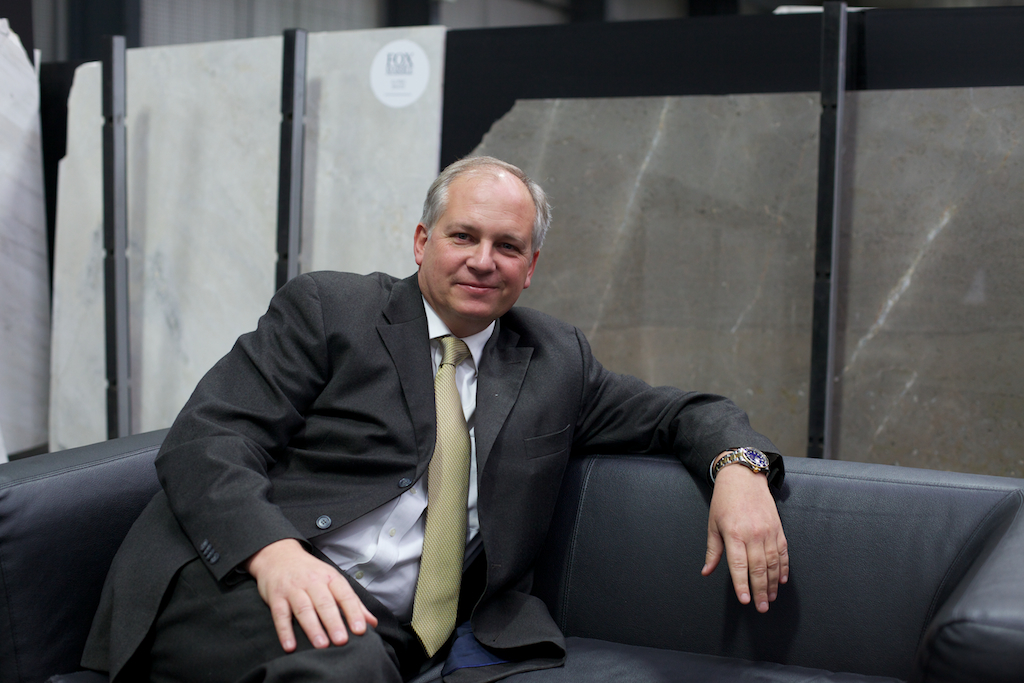Stone wholesaler Pisani, established in 1938, has called in the Administrators. Costas Sakellarious, Pisani PLC's Managing Director and major shareholder, says the decision was his and his family's and promises a statement when issues have been settled with the Administrators. He told Natural Stone Specialist: "Sometimes keeping the core of the business intact is just too expensive."
A new company, called Pisani Wholesale, was incorporated on 11 May by Sebastian Harris, Pisani's Chief Operating Officer, trading from premises in Matlock, Derbyshire (High Peak Junction, Whatstandwell, Matlock DE4 5HN) on the same site previously occupied by Pisani PLC. You can visit the website of the new company at www.pisaniwholesale.co.uk.
Once a leading force in the stone industry and always a major influence in spite of the difficulties it had endured since the credit crunch in 2008-09 (read the take on that by Costas Sakellarious here), Pisani posted notification of the appointment of Administrators on its website this month (June).
It reads: "Lee Antony Manning and Matthew David Smith were appointed joint administrators of Pisani Plc (the 'company') on June 8, 2017. The affairs, business and property of the company are managed by the joint administrators. The joint administrators act as agents of the company and contract without personal liability."
Lee Manning and Matthew Smith are from the Birmingham office of accountant Deloitte.
A statement from Deloitte says: "Prior to our appointment the company had attempted to raise additional investment for the business but was unsuccessful. Due to cash flow constraints and the threat of a winding up petition by HMRC, the company was unable to pay its liabilities when they fell [due] and the company directors had no alternative but issue a Notice of Intention to Appoint Administrators on 31 May..."
Pisani PLC has a 3,000m2 showroom and distribution headquarters in Feltham, Middlesex, which it relocated its London operations into in 2008, just ahead of the economic crisis. The timing could not have been worse. Pisani created ultra-stylish premises for clients and specifiers to visit to select their stone but saddled itself with debts and high business rates just as the market crashed and banks decided to end their support for construction companies, which Pisani did not escape. Pisani also has a three-acre depot in Derbyshire, near Matlock, and the three-acre Fyfe Glenrock stone centre in Aberdeen, Scotland, that the business there moved into in 2006.
According to Pisani PLC accounts, for the year ending 31 December 2015 it had a pre-tax profit of £34,278. It had recorded losses of more than £815,000 in 2013 and more than £2million in 2014. A £752,000 loan from a Greek company associated with Costas was written off in 2015. In its 2015 accounts Pisani said it employed 49 people. Turnover in 2015 rose to £9.9million from £5.6million in 2014, according to the 2015 accounts. The accounts to the end of 2014 were for an 18 month period showing a turnover of £9.2million. In 2007 the Pisani PLC turnover had been £26.5million with pre-tax profits of £1.2million. At that time it was still a major supplier of stone processing machinery in the UK as well as the largest stone slab wholesaler.
In the 2015 annual report Costas wrote: “The objectives of the directors have been to re-establish the company after 80 years of trading to better deal with current market conditions and requirements. The rebuilding process following the banking crisis has been an arduous process and the company has worked very closely with its bankers to achieve this.”
He added: “The directors have considered the risks of the company not being able to continue as a going concern and have considered carefully the implications of current trading performance and influencing external factors facing the business. Having considered the internal and external factors affecting the company, the directors believe that there are no issues regarding the company's ability to continue as a going concern for the foreseeable future.”

